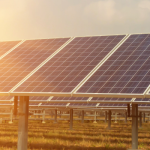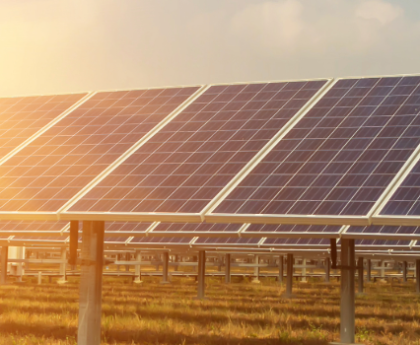The Biden administration is offering bonus tax credits to boost solar energy manufacturing, a move being taken just days after President Joe Biden announced new, tough tarrifs against Chinese products the White House says undercut the American industry.
“The president saw this clearly from day one of his administration: not only the threat that supply chain risks pose to our economic strength, but also to our capacity to deliver on our climate ambitions,” White House National Climate Advisor Ali Zaidi told reporters Wednesday.
The moves, announced Thursday, will remove exclusions of two-sided — or bi-facial — solar panels from tariffs on imported solar cells, and offer bonus tax credits to encourage domestic production of solar cells and modules.
Manufacturers of domestically-produced iron, steel and products mined, produced or made in the United States will get a Production Tax Credit for clean energy. According to the White House, projects can earn the full value of a 10% bonus if their project meets a domestic content requirement and one of three other requirements focused on labor, energy output or beginning work before Jan. 29, 2023.
Thursday’s announcement “creates a new elective safe harbor that gives clean energy developers the option of relying on [Department of Energy]-provided default cost percentages for an exhaustive set of manufactured products and their components,” the Treasury Department said in a press release. The department’s information simplifies matters for companies, instead of having to ask suppliers for information to help them finalize details in applying for tax credits.
Essentially, as long as manufacturers meet the government’s conditions, they can collect a bonus tax credit.
“Today’s new safe harbor approach will make it simpler for more companies to take advantage of this powerful incentive and support good-paying American jobs,” said John Podesta, Biden’s senior international climate policy advisor.
It also helps reduce the impact that new tarrifs will have in limiting Chinese imports that have oversupplied U.S. markets, Podesta said.
“We’re taking these new actions this week to support with clean energy industries, to both make sure we are doing our part to reduce emissions and to make sure our competition with China is actually fair,” Podesta added.
Earlier Tuesday, Biden announced significant new tarrifs on Chinese technology imports, including electric vehicles, solar panels, batteries, certain steel and aluminum exports, port cranes and other technologies.
“American workers can outwork and out-compete anyone, as long as the competition is fair,” Biden said. “And for too long, it hasn’t been fair.”
Tariffs on Chinese EV imports will quadruple from a 25% tax to 100%, and double from 25% to 50% on solar cells and semiconductors. Some tariffs will start this year, while others will begin over the next two years.
The goal, National Economic Council director Lael Brainard said on a press call on Monday afternoon, is to prevent domestic spending legislation from being “undercut by a flood of unfairly underpriced exports from China in areas like EVs batteries, vital medical equipment steel and aluminum semiconductors and solar.”
Beyond flooding markets with artificiallycheap products, China’s anticompetitive practices include hacking technology, intellectual property theft, labor rights suppression, weak environmental protections and flooding markets with artificially cheap products, U.S. Trade Representative Katherine Tai said at a briefing Tuesday.
In the long run, unfair competition undermines the “virtuous cycle” of investing in domestic manufacturing, a senior White House official said Wednesday. A goal of these investments by the federal government is to build up American industry to the point that newer technologies like solar go down in cost by 25% — but will only happen if there’s a level playing field, they added.
This post was originally published on 3rd party site mentioned in the title of this site





